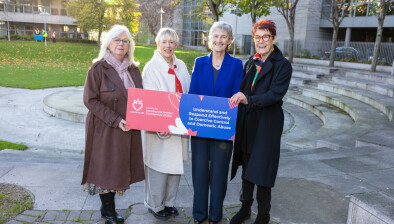High Court: Historic sex abuse allegation decision quashed

Andrew McKeown BL
The High Court has quashed a decision by Tusla, the Child and Family Agency (CFA), reaching a “provisional conclusion” that a man had engaged in sexual acts with a child in its review of historic sex abuse allegations.

About this case:
- Citation:[2020] IEHC 464
- Judgment:
- Court:High Court
- Judge:Mr Justice Garrett Simons
Mr Justice Garrett Simons said that the case illustrated “the very real practical difficulties which can arise in attempting to inquire into child sexual abuse which is said to have been perpetrated decades earlier”.
Background
The complainant made a complaint to the CFA in December 2013. The Child Care Act 1991 (as amended) provides that it must inquire into complaints of child sexual abuse, including historical abuse.
The complainant alleged in 1969, when he was 9 years old, he was doing odd jobs in a hotel. At the time J, who the complainant guessed was about 16 or 17 years old, worked there. He alleged that J lured him into bed, and he recalled that they were naked and “playing with each other”. He said this happened on three separate occasions that summer. He said J told him not to tell anyone. The complainant told social workers this may have played a part in him having a mental breakdown aged 23 and having had ongoing mental health issues. The social worker’s decision stated that the complainant’s emotional reaction was “consistent with the abuse being described”.
A complaint was made to An Garda Síochána shortly thereafter, and the Director of Public Prosecutions ultimately directed that no charges be brought against J. The CFA closed its file into the complaint in September 2016. The investigation was reinstated in November 2017.
J (A Person Subject to an Allegation of Abuse) instituted proceedings challenging a decision issued by the CFA in July 2018 to the effect that it had reached a “provisional conclusion” that contact of a sexual nature had occurred between J and the complainant in 1969. The decision-letter indicated that if the outcome of a social work assessment concluded that the concerns were “founded”, and that J poses a potential risk to children, then the CFA may need disclose that information to third parties, such as his employer, his family or any other relevant person. He was notified that a finding of “founded” had been made.
The CFA conceded that the impugned decision was invalid and should be set aside. The CFA submitted that it should be entitled to continue its inquiries against J. He sought orders restraining further inquiry into the events alleged to have occurred.
High Court
The Child and Family Agency Act 2015 s.8(1)(b) provides that one of the functions of the Agency is to support and promote the development, welfare and protection of children. Mr Justice Simons said that a “well-established line of case law” provides a broad interpretation of that statutory function. In MQ v Gleeson [1998] 4 IR 85, Mr Justice Robert Barr highlighted the risk inherent in unfounded complaints of child abuse to lead to “great injustice and harm”. The judgment sets out certain safeguards, known as “the Barr principles”.
In P(DP) v Board of Management of a Secondary School [2010] IEHC 189, Mr Justice Iarfhlaith O’Neill noted that it is not necessary to identify specific children at risk. A broad interpretation of s.3 was endorsed in WM v CFA [2017] IEHC 587; TR v CFA [2017] IEHC 595; and FA v CFA [2018] IEHC 806.
Morgan Shelley BL, instructed by Arthur Denneny for the CFA, explained that the practice, in cases involving historical child sexual abuse allegations, is first to determine whether the allegation of child sexual abuse is “founded” or “unfounded” before moving on to a risk assessment.
Mr Justice Simons identified a difficulty with the CFA’s approach, in that suggests that the CFA’s role is to adjudicate on an adversarial dispute between a complainant and an alleged abuser, whereas its role is in fact inquisitorial.
While it may be necessary for the CFA to reach a conclusion on the credibility of an allegation of child sexual abuse, its principal focus must always be on the protection of children. It is not its role to vindicate the complainant nor to sanction an alleged abuser: “A complainant has a separate remedy by way of civil proceedings for damages, and any sanction… is a matter for the criminal justice system.”
The court noted Mr Justice Richard Humphreys’s judgment in CD v CFA [2020] IEHC 452, where he opined that “the duty to promote the welfare of children in need of protection is a foundation for a wide-ranging power to investigate and make findings of child abuse against potentially anybody against whom an allegation is made, because any child abuser could in future abuse children in need of protection. That logic is a very slender and wobbly basis for an entire statutory jurisdiction to conduct child sexual abuse inquiries and findings or indeed findings as to any other form of child abuse or neglect. One can only suggest that perhaps the Oireachtas might consider that this particular area warrants a more explicit statutory underpinning for the procedures of investigation of child harm.”
The CFA conceded that the impugned decision was invalid and should be set aside. It was conceded that the CFA failed to apply the correct standard of proof, the balance of probabilities, in reaching its provisional conclusion. The CFA conceded that the language employed in the impugned decision, that it was “deemed likely” that some contact of a sexual nature occurred, implies that the incorrect test was applied.
It was also conceded that only one of the two social workers who had signed off on the provisional conclusion had interviewed the complainant. This was significant, as the impugned decision made express reference to the complainant’s emotional reaction being consistent with the abuse being described. This conveyed the impression that both decision-makers had observed the complainant’s demeanour.
Raymond Comyn SC and Sharon Brooks BL,instructed by Collins, Brooks & Associates LLP for J, submitted that the CFA should be restrained from any further investigation into the alleged historical child sexual abuse. Counsel attached significance to the fact that the CFA had made a decision to close the file into the complaint in September 2016. Counsel argued that the CFA must have been satisfied that J presented no risk to any child. Given this decision, it was argued that it is unnecessary for the CFA to carry out a further investigation.
Mr Shelley, for the CFA, placed emphasis on P(DP) where notwithstanding the finding of the High Court that there had been a “litany of failures”, on the part of the body empowered to safeguard children’s welfare, to adhere to the requirements of fair procedures in its conduct of its investigation into allegations made, the judge refused an order continuing an investigation into allegations of child sexual abuse.
Mr Justice Simons noted the court had to consider whether, in addition to quashing the impugned decision by way of an order of certiorari, it should make an order restraining the CFA from carrying out any further investigation of the alleged abuse said to have occurred in the summer of 1969.
Ord.84 r.27(4) RSC provides that a court has a discretion, having quashed an administrative decision, to remit the matter to the decision-maker concerned with a direction to reconsider it and reach a decision in accordance with the findings of the court. In Tristor Ltd v An Bord Pleanála (No. 2) [2010] IEHC 454, Mr Justice Frank Clarke emphasised that the overriding principle behind any remedy in civil proceedings should be to attempt, in as clinical a way as is possible, to undo the consequences of any wrongful or invalid act. The court should not seek to do more than that, but equally the court should not seek to do less than that. In Christian v. Dublin City Council (No. 2) [2012] IEHC 309, Mr Justice Clarke said that it isn’t “necessary for a court which quashes an order or measure made or taken at the end of a lengthy process to necessarily require that the process go back to the beginning”.
Mr Justice Simons said that the courts discretion under Ord.84 will, in alleged child sexual abuse cases, be exercised in favour of remittal, because the best interests of the child must be the paramount consideration in proceedings which have the purpose of preventing the safety and welfare of any child from being prejudicially affected.
An order which restrained the CFA from fulfilling its obligations under the Child Care Act 1991 “would be inconsistent with that paramount consideration”.
On the facts, however, the CFA had already discharged its statutory function and an order for remittal is not necessary to give effect to section 3. He said that, faced with a complaint of alleged abuse said to have taken place almost fifty years previously, the approach taken by the CFA was entirely understandable: “Without in any way diminishing the devastating effects that even a single incident of child sexual abuse can have on a victim, the fact that the complaint in the present case is confined to three isolated incidents which occurred more than half a century ago presents very real practical difficulties in assessing the credibility of the complaint.”
The judge said that none of this should be understood as being in any way a criticism of the complainant: “The traumatic effects of child sexual abuse are such that a victim will often be unable to recall precise details. Nevertheless, these factors do impose limitations on the ability of even a qualified social worker to safely make a finding, at a remove of some fifty years, that a complaint of alleged child sexual abuse is ‘founded’.”
Conclusion
The decision-letter was quashed, and the CFA was not estopped, by its initial decision to close the file, from commencing a fresh investigation.










